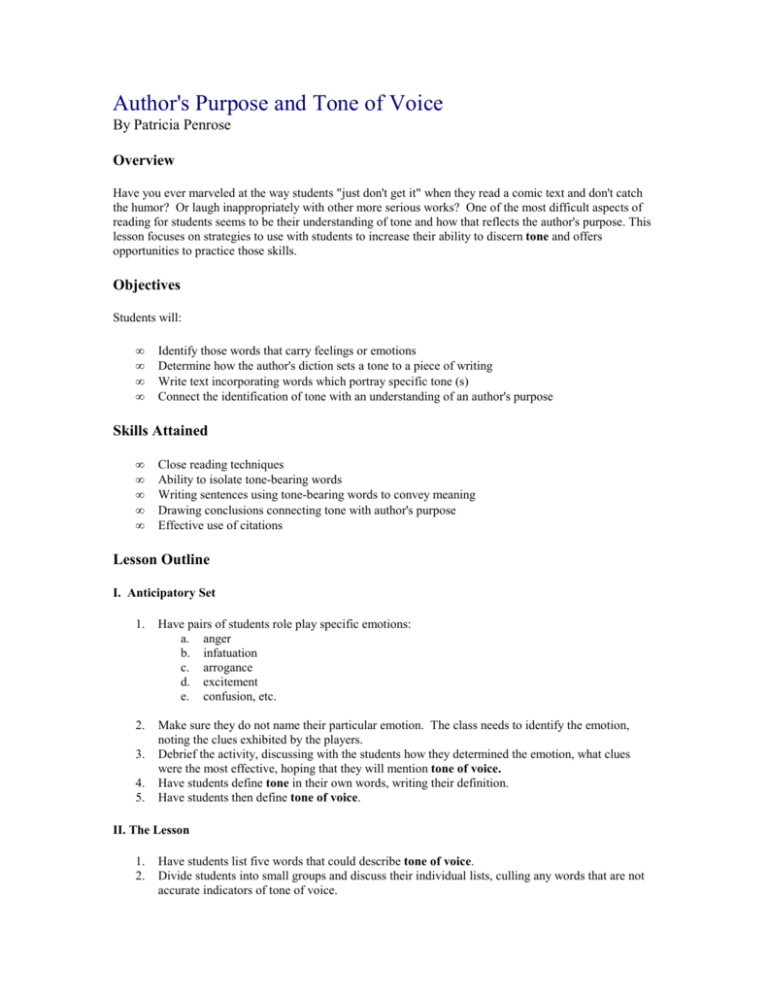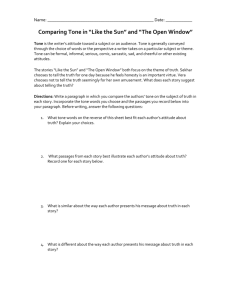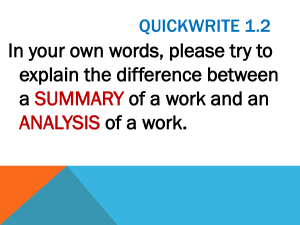Author's Purpose and Tone of Voice
advertisement

Author's Purpose and Tone of Voice By Patricia Penrose Overview Have you ever marveled at the way students "just don't get it" when they read a comic text and don't catch the humor? Or laugh inappropriately with other more serious works? One of the most difficult aspects of reading for students seems to be their understanding of tone and how that reflects the author's purpose. This lesson focuses on strategies to use with students to increase their ability to discern tone and offers opportunities to practice those skills. Objectives Students will: • • • • Identify those words that carry feelings or emotions Determine how the author's diction sets a tone to a piece of writing Write text incorporating words which portray specific tone (s) Connect the identification of tone with an understanding of an author's purpose Skills Attained • • • • • Close reading techniques Ability to isolate tone-bearing words Writing sentences using tone-bearing words to convey meaning Drawing conclusions connecting tone with author's purpose Effective use of citations Lesson Outline I. Anticipatory Set 1. Have pairs of students role play specific emotions: a. anger b. infatuation c. arrogance d. excitement e. confusion, etc. 2. Make sure they do not name their particular emotion. The class needs to identify the emotion, noting the clues exhibited by the players. Debrief the activity, discussing with the students how they determined the emotion, what clues were the most effective, hoping that they will mention tone of voice. Have students define tone in their own words, writing their definition. Have students then define tone of voice. 3. 4. 5. II. The Lesson 1. 2. Have students list five words that could describe tone of voice. Divide students into small groups and discuss their individual lists, culling any words that are not accurate indicators of tone of voice. 3. 4. 5. 6. 7. Bring the whole class together and combine their lists, making one master list. Ask students to select 5-7 words that they individually didn't contribute from the list and write one sentence for each word that indicates tone of voice without specifically using the tone descriptor. For example: Standing tall, a smile wreathing her face, she watched, misty-eyed, as her youngest son received his diploma. (proud) Without specifically saying that the mother was proud, the writer conveyed that feeling by the use of standing tall, misty-eyed, smile. Have the students share their sentences in small groups and report out to the class the best 3-5 sentences, each one illustrating a different tone. Combine for a class master list. Post for future reference. To connect this activity to texts that students read, explain how writers, unable to use tone of voice to indicate their feelings about a subject or a character, follow the same pattern the students did in choosing words which convey emotion, tone. Give the following paragraph from The Ponder Heart to students and have them identify the tone that Welty is conveying: o My papa was Grandpa's oldest child and Uncle Daniel was Grandpa's baby. They had him late—mighty late. They used to let him skate on the dining room table. So that put Uncle Daniel and me pretty close together—we liked-to caught up with each other. I did pass him in the seventh grade, and hated to do it, but I was liable to have passed anybody. People told me I ought to have been the teacher. a. b. c. What attitude does the speaker have toward herself, toward Uncle Daniel, toward her grandparents? What words carry the emotion of the passage? If you were to read this passage aloud, how would your voice sound? What words would you emphasize? o Read the following passage from "Cora Unashamed," by Langston Hughes: o Cora was the oldest of a family of eight children—the Jenkins niggers. The only Negroes in Melton, thank God! Where they came from originally—that is, the old folks—God knows. The kids were born there. The old folks are still there now: Pa drives a junk wagon. The old woman ails around the house, ails and quarrels. Seven kids are gone. Only Cora remains. Cora simply couldn't go, with nobody else to help take care of Ma. And before that she couldn't go, with nobody to see that her brothers and sisters got through school (she the oldest, and Ma ailing). And before that—well, somebody had to help Ma look after one baby behind another that kept on coming. o As a child Cora had no playtime. She always had a little brother, or a little sister in her arms. Bad crying, bratty babies, hungry and mean. In the seventh grade she quit school and went to work with the Studevants. a. b. c. o What is the attitude of the author toward the Jenkins family? What words carry the emotion or tone? How does he feel about Cora? How do you know this? This same activity can be used with passages from other texts. Formulate your questions so that students will focus on the diction of the author, looking for the emotional overtones of the words and then extrapolate from there his/her tone or attitude. Assessment Students will be evaluated on the following criteria: • Understanding of the text(s) • • • • Use of textual evidence to support their contentions Effectiveness of their writing Display of style and voice in written expression Ability to use effectively the conventions of standard written English





